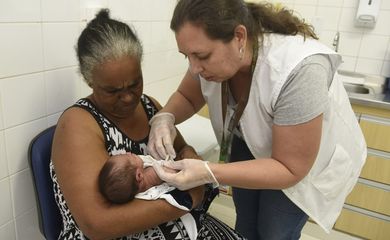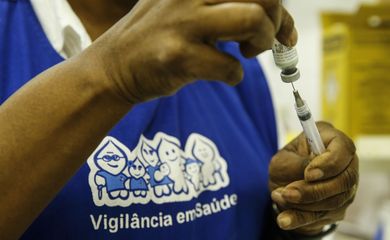Vaccination in Brazil sets global example, but challenges still abound

To prevent measles in a child from an indigenous territory in Maranhão state, to vaccinate a bedridden elderly man against pneumonia in a Rio favela, to protect a teenager injured by a wild bat from rabies in the woodlands of Minas Gerais, to immunize a baby against tetanus while still in the womb, to administer hundreds of millions of vaccines a year across over 5 thousand municipalities—doing all this safely and free of charge is what has made Brazil’s National Immunization Program (PNI) the largest in the world, a role model even to developed countries.

For 50 years, the program has been carrying out the ambitious mission of immunizing a huge population spread over a continent-sized territory named Brazil, deeply marked by the diversity of cultures and landscapes and contrasting living conditions.
Despite being dubbed the largest free public vaccination program in the world—with 20 jabs that have eliminated major diseases such as polio, neonatal tetanus, and congenital rubella—the program is celebrating half a century in existence as it struggles to reverse setbacks that have brought vaccination coverage back to the levels of the 1980s. Researchers are optimistic about the program’s new moment, but point out there is still a long way to go.
A global landmark
The head of health at the United Nations Children’s Fund (UNICEF) in Brazil, Luciana Phebo, described the program as a global landmark, especially for countries with low and middle incomes and socio-economic similarities with Brazil.
“It’s a model not just for Latin America, but for African countries as well. And UNICEF, together with the WHO [World Health Organization], also plays the role of taking Brazil’s good practices to other nations in similar contexts. The program’s important not only for Brazil. It’s important for the whole world.”
Brazil, Phebo went on to note, boasts crucial tools that have created the conditions for such a successful program—including a public health system for all, state-of-the-art institutions that produce vaccines, and a primary care network that should still be improved, but serve a large number of people who need vaccination.
“The SUS [Brazil’s Unified Health Care System] is extraordinary. It’s above what we see in across the world, even in developed countries, with its comprehensiveness and unified management, with the Ministry of Health reaching the most remote municipalities and the entire national territory, which is extremely vast. Few countries have such a structure.”
The declines in vaccination coverage since 2015, however, have raised the alarm of health authorities in both Brazil and abroad, as the possibility of once-eliminated diseases making a comeback has become a cause for concern.
“With the pandemic, this reduction grew worse. In post-pandemic days, there’s been a slight improvement and the curve’s beginning to take a different turn, but this response should be faster. It hasn’t yet accelerated enough to ensure diseases like polio and measles don’t return,” she argued.
Piecemeal reconstruction
In an interview with Agência Brasil, Health Minister Nísia Trindade said the government has been working to re-establish the program’s leading role and restore society’s confidence in the ministry’s authority. The challenge is being tackled, she said, but full reconstruction should still take time.
Still according to the minister, regaining high vaccination coverage can bring Brazil back to its position as an international model and help contribute to tackling denialism and vaccine hesitancy. “Our goal is to once again become an example to the world. Resuming this position and stepping up cooperation with other countries, including in vaccination, is our priority,” she declared.
The SUS
Carla Domingues, consultant for the Pan American Health Organization (PAHO) and former PNI coordinator, said the program was bolstered after it was turned into a state policy, taking shape under the military dictatorship and passing through different democratic governments later on. The strength it achieved, however, came about mainly in the 1990s, when Brazil’s Unified Health Care System, or SUS, was created.
“The National Immunization Program was an example of success because all the principles of the SUS were effectively consolidated, starting with its universal character, as all vaccines reach the entire Brazilian population—whether it’s in large cities, medium-sized towns, riverside communities, or indigenous people,” said Domingues, who led the national plan for 13 years.
She recounted that the success lasted until 2016, when the main indicators started to shrink: “Unfortunately, we’re no longer a model. The big challenge is to reestablish the trust we enjoyed for more than four decades, with Brazilians acting responsibly and going to vaccination facilities on a regular basis.”
A turning point introduced by the national initiative, the specialist explained, was the participation of states and municipalities in immunization policies, with defined attributions for each sphere of government. The centralized, large-scale purchase of vaccines for the whole country by the federal government, also guaranteed by the program, was essential to vaccinate all populations, regardless of the financial or budgetary priorities of their states.
“Until the 1970s, smallpox, polio, and rubella programs made their own purchases, and there was no national vaccine procurement policy. For diseases like measles, diphtheria, tetanus, and whooping cough, the states with resources ran their state programs. This had no impact on eliminating the diseases. With centralized purchases, decentralized distribution and application, guaranteed supply, and a transport and logistics chain, implementing this vaccination policy became possible.”
Calendars for everyone
All this structure has allowed the program to go from the four vaccines offered in the 1970s to the 20 vaccines available today, with calendars for children, adolescents, adults, and pregnant women, and large-scale campaigns like the annual vaccination against influenza.
Such achievements have led Brazil to be invited to talk about its experiences at PAHO, said Carla Domingues, who adds that the country has also swiftly implemented the recommendations and commitments discussed at the international body.
“Brazil served as a model when the organization showcased its success stories, especially because of the challenges, as it’s such a large country, with dispersed populations and starkly different geographical conditions.”
*Tâmara Freire from Rádio Nacional contributed to this article.





